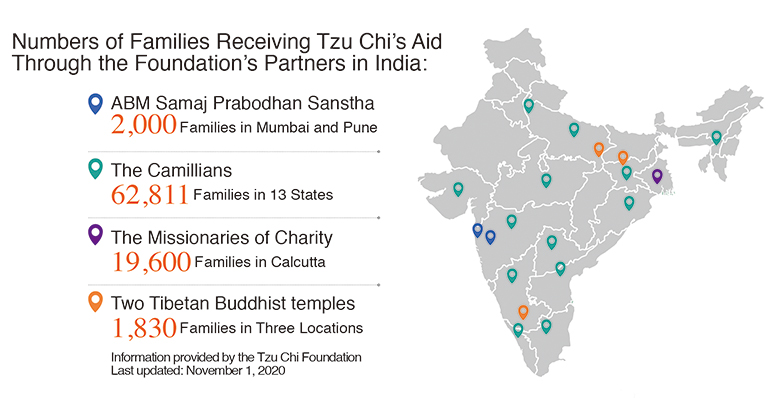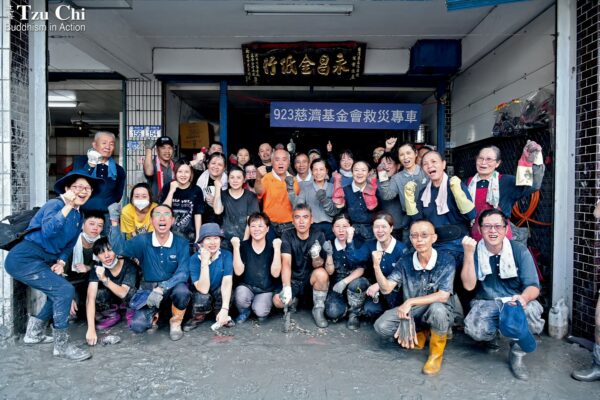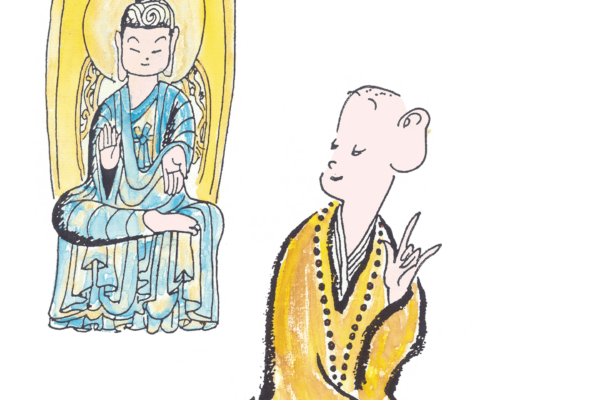By Ye Zi-hao
Translated by Tang Yau-yang
Photos courtesy of the Tzu Chi Foundation
Tzu Chi has worked with several organizations in India to help needy people in that nation through the economic challenges caused by the pandemic.
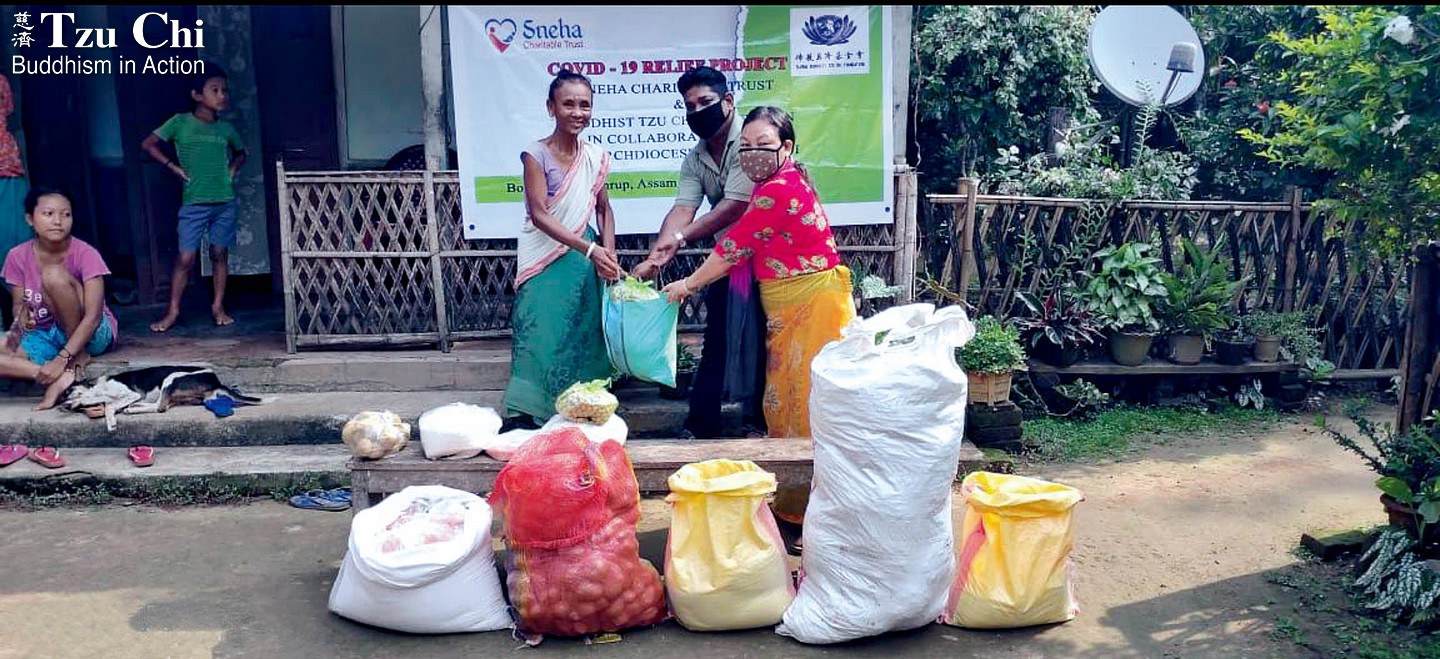
The Camillians held aid distributions in India with the help of the police and other organizations.
By early December 2020, more than 9.7 million people in India had been infected by the COVID-19 virus, the second highest number in the world. The Indian people have paid an immeasurable cost for lockdowns and closings in their fight against the virus. More than 100 million people lost their jobs and were in dire need of assistance.
The Tzu Chi Foundation wanted to help directly, but it had no branch office in India, making it difficult to render aid. Instead, the foundation has collaborated with other organizations, including the Camillians (a Roman Catholic religious order), the Missionaries of Charity, and two Tibetan Buddhist temples to distribute aid to people in India to help them through the pandemic. By the end of October 2020, the aid provided by Tzu Chi had reached 100,000 families.
The cooperation between Tzu Chi and the Camillians came about as follows. On April 1, 2020, Father Giuseppe Didone, a Camillian priest who has lived and served in Taiwan since 1965, issued an appeal to the Taiwanese people for monetary donations to buy desperately needed medical supplies to help his native Italy combat the coronavirus. In just six days, more than 20,000 Taiwanese had responded with donations totaling 120 million New Taiwan dollars (US$3.9 million) to support the priest’s drive. Although the donation campaign was planned to run for two weeks, the generous outpouring of support from the Taiwanese people enabled him to halt the drive after a single week.
Tzu Chi became involved in this effort when Father Didone needed help to purchase the medical supplies to send to his home country. Yan Po-wen (顏博文), CEO of the Tzu Chi charity mission, personally visited Camillian Saint Mary’s Hospital in Yilan, northern Taiwan, to discuss with the priest and his team how Tzu Chi could help. The foundation subsequently mobilized its volunteers in China and elsewhere to help him procure medical supplies in a global market severely strained by the raging pandemic.
Later, Father Didone learned that Tzu Chi wanted to help India fight the pandemic but was experiencing difficulties because they lacked a chapter there to carry out the work. This provided him an opportunity to help Tzu Chi as they had helped him. Father Didone and his team contacted the Camillians in India and asked them to help Tzu Chi out.
The Camillians in India helped send Tzu Chi’s food aid to 13 states in the country, including Assam, in northeastern India, and Gujarat, on the western coast of India, where Mahatma Gandhi and Prime Minister Narendra Modi were born. Tzu Chi’s aid has also reached New Delhi, India’s capital, with the help of the Camillians.
The Missionaries of Charity, founded by Mother Teresa, also helped distribute relief goods in Calcutta on behalf of Tzu Chi. With their assistance, food and other necessities donated by Tzu Chi reached 19,600 households in Calcutta.
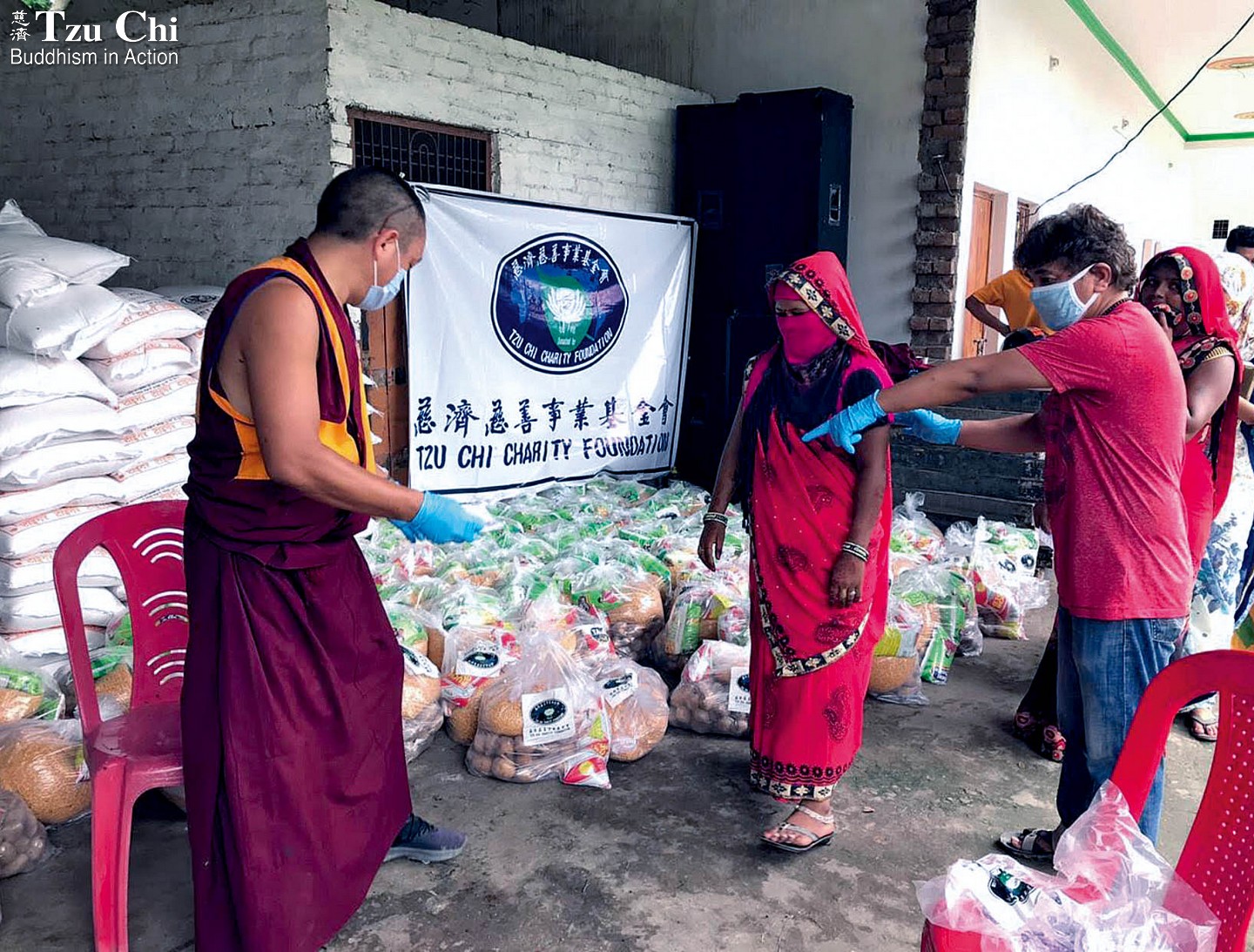
Tzu Chi-supplied relief goods were distributed at a Buddhist temple to underserved families in Bodhgaya and Varanasi, in northern India.
Tide them over an impasse
Another organization that has enabled Tzu Chi’s COVID aid to reach India is ABM Samaj Prabodhan Sanstha. Pravin Bhalesain, a member of this non-profit organization, was introduced to Tzu Chi in 2014 during an international Buddhism conference in India. He and his mother visited Dharma Master Cheng Yen in Taiwan in March of the following year. When Nepal was hit by an earthquake a month later, Bhalesain joined a Tzu Chi relief team that traveled to that country to help survivors. He has since facilitated Tzu Chi’s relief efforts in India.
When the pandemic broke out in 2020, Bhalesain arranged for ABM members to distribute food provided by Tzu Chi to 2,000 needy families in Mumbai and Pune, the two biggest cities in the state of Maharashtra, in western India.
Rosalie Chen (陳尚薇), a Tzu Chi staffer in Taiwan who helps handle the foundation’s aid to India, said of ABM’s work: “They started compiling distribution rosters near the end of May. It was a difficult task because the slums [receiving Tzu Chi’s aid] were widely dispersed. And though there were volunteers in every district willing to compile the rosters, there were no computers to help them with the work. Everything had to be done by hand.” She displayed photos of some handwritten rosters.
In late May, Cyclone Amphan hit India, exacerbating the already grim situation during the pandemic and making the need for relief goods even more urgent. Adding insult to injury, lockdown measures enforced by the Indian government made ABM members’ work of compiling rosters even more difficult. In the beginning, ABM members could still apply for and obtain permits to visit the needy. But in July, Mumbai and Pune made the lockdowns in those cities even more restrictive, stopping the volunteers in their tracks. The compilation of distribution rosters came to a screeching halt.
The government relaxed the lockdown restrictions in August, not because the spread of the virus had slowed, but because it was becoming impossible for people to maintain their bare existence. ABM jumped on the opportunity to distribute Tzu Chi-supplied goods. Since large distribution events would have attracted crowds of one to two thousand aid recipients, ABM opted to hold smaller distributions to minimize the risks of infection. The volunteers followed delivery trucks to one village after another, distributing to dozens of families at each stop. They protected themselves with masks and gloves. In contrast, most recipients were too poor to afford masks, so many of them used a corner of their saris to cover their mouths. Though that was probably the best they could do, one couldn’t help but be concerned about their safety.
In the height and heat of the pandemic, there was no guarantee that volunteers would come back safe and sound from a distribution; they could only do their utmost to protect themselves and hope for the best. “Every time I contacted our volunteers,” Rosalie Chen said, “I asked them to please be very, very careful. I asked them, ‘Did you take proper precautionary measures?’ every time they went out for a distribution or when they sent back messages.” Chen clearly recalled the first thing Pravin Bhalesain said to her during their first video conference after the distributions were launched: “Sister, I’m still alive.”
If the conditions allowed, the volunteers would set up at distribution venues the portraits of the Buddha and Dr. B. R. Ambedkar (1891–1956), an Indian politician and social reformer. Dr. Ambedkar had inspired the Dalit Buddhist movement and campaigned against social discrimination towards the Dalits, sometimes referred to as “the untouchables.” Most of the recipients of Tzu Chi’s aid were from the bottom echelons of Indian society; to them, the Buddha and Dr. Ambedkar were symbols of hope—the former advocating equality and compassion for all, and the latter pushing for the abolition of the caste system in the nation.
ABM volunteers also relayed Tzu Chi’s best wishes at the distribution events. They hung up a banner that read: “Tzu Chi Cares for You,” and read aloud a letter from Master Cheng Yen in English and Marathi, a local language.
Sitaram Gaikwad, founder and head of ABM, said that it was his honor to translate the letter from Master Cheng Yen into their local language. He had read each word and phrase in the letter more than a hundred times. He felt that everything in the letter reflected what every person in the world should awaken to in order to ensure the survival of mankind.
He pointed out that he had been born an untouchable. One day 64 years ago, he and his mother were begging in a village when someone said to his mother, “You’re not an untouchable any more. You are a Buddhist now, so stop begging.”
After he became a Buddhist, Gaikwad did his best to become self-reliant. He stopped considering himself an untouchable, and worked hard to shatter the shackles of the caste system and become a respected member of society. He founded ABM in 1984. ABM members follow and spread the beliefs of Dr. B. R. Ambedkar. Pulling together love and kindness from society, ABM has dedicated themselves to helping and empowering the disadvantaged people of society for 34 years now.
Gaikwad commended Tzu Chi for allowing them to help thousands of underprivileged families during the difficult time of the pandemic. In a challenging time like this, only love and mutual help can pull people through.
